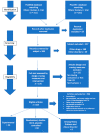Pharmacological Treatment of Alcohol Cravings
- PMID: 37626562
- PMCID: PMC10452441
- DOI: 10.3390/brainsci13081206
Pharmacological Treatment of Alcohol Cravings
Abstract
(1) Background: The treatment of substance addiction is challenging and has persisted for decades, with only a few therapeutic options. Although there are some recommendations for specific treatments for Alcohol Use Disorder (AUD), there is no specific medication used to treat alcohol cravings, which could benefit millions of patients that are suffering from alcoholism. Cravings, or the urge to use drugs, refer to the desire to experience the effects of a previously experienced psychoactive substance. (2) Methods: We included original studies of alcohol abuse or dependence extracted from a controlled, blind, pharmacological treatment study which presented measures and outcomes related to alcohol cravings. (3) Results: Specific drugs used for the treatment of alcoholism, such as Naltrexone and Acamprosate, have had the best results in relieving craving symptoms, as well as promoting abstinence. Baclofen and anticonvulsants such as Gabapentin and Topiramate have shown good results in promoting abstinence and the cessation of cravings. (4) Conclusions: Specific drugs used for the treatment of alcoholism to obtain the best results can be considered the gold standard for promoting abstinence and relieving cravings. Anticonvulsants and Baclofen also had good results, with these medications being considered as second-line ones. Varenicline is an option for alcohol dependents who also concomitantly ingest tobacco.
Keywords: alcohol; craving; randomi* controlled blind*.
Conflict of interest statement
The authors declare no conflict of interest.
References
-
- World Health Organization. [(accessed on 12 July 2022)]; Available online: https://www.who.int/news-room/fact-sheets/detail/alcohol.
-
- Likhitsathian S., Uttawichai K., Booncharoen H., Wittayanookulluk A., Angkurawaranon C., Srisurapanont M. Topiramate treatment for alcoholic outpatients recently receiving residential treatment programs: A 12-week, randomized, placebo-controlled trial. Drug Alcohol Depend. 2013;133:440–446. doi: 10.1016/j.drugalcdep.2013.06.032. - DOI - PubMed
-
- Richter C., Effenberger S., Bschor T., Bonnet U., Haasen C., Preuss U.W., Heinz A., Förg A., Volkmar K., Glauner T., et al. Efficacy and safety of levetiracetam for the prevention of alcohol relapse in recently detoxified alcohol-dependent patients: A randomized trial. J. Clin. Psychopharmacol. 2012;32:558–562. doi: 10.1097/JCP.0b013e31825e213e. - DOI - PubMed
-
- American Psychiatric Association . Diagnostic and Statistical Manual of Mental Disorders. 5th ed. American Psychiatric Association; Washington, DC, USA: 2013.
-
- Chick J., Anton R., Checinski K., Croop R., Drummond D.C., Farmer R., Labriola D., Marshall J., Moncrieff J., Morgan M.Y., et al. A multicentre, randomized, double-blind, placebo-controlled trial of naltrexone in the treatment of alcohol dependence or abuse. Alcohol Alcohol. 2000;35:587–593. doi: 10.1093/alcalc/35.6.587. - DOI - PubMed
Publication types
LinkOut - more resources
Full Text Sources


